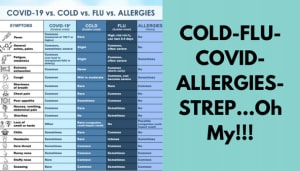
November 12, 2021 “COLD- FLU-COVID-ALLERGIES, STREP...OH MY!!!”
As I was driving home from the gym this morning, with the sun shining so bright, I admired the beautiful fall colors of the leaves. Red, orange, yellow, green, and burgundy, the sight was so breathtaking. I had to run a few errands and when I returned to my car I began to sneeze. I happen to be on the phone and instead of the person saying, “God bless you” she was like…Oh my…do you have Covid? We laughed because I knew she was joking; however, a sneeze is no longer just a sneeze. The questions start to swirl either within yourself or those around you. Am I getting a cold, is this the beginnings of the flu, could I have Covid again or is this just seasonal allergies?
No matter how you answer it is important to understand the difference so that not only will you protect yourself but others as well. You also want to get ahead of the symptoms before they get so severe that it knocks you off your feet for days or weeks.
What is the difference between Allergies, Covid, Cold, Flu and Strep Throat?
ALLERGIES
Allergy symptoms range from mild to severe and can occur seasonally or be present year-long. In patients with asthma, allergies can cause a cough, wheeze, and shortness of breath. Allergies are caused by your immune system overreacting to normal things in your environment, such as pollen, dust, mold, and pet dander. More importantly allegories are not contagious. Medications can typically treat your symptoms and immunotherapy allergy shots can often help patients find long-term relief. Treatment of seasonal allergies may include over the counter or prescription antihistamines, nasal steroid sprays, decongestants, and avoidance of exposure to allergens where possible. Seasonal allergies may last several weeks.
COVID-19
The coronavirus (COVID-19) is a contagious viral illness that can be spread in ways that include coughing, sneezing, and close personal contact. Symptoms typically start between 2-14 days after exposure and usually resolve within ~14 days after onset. Whether the symptoms are mild, moderate, or severe, it is important to note that if you have received the COVID-19 vaccine, it is still possible you can get COVID-19. If you are vaccinated and test positive for COVID-19, your symptoms are expected to be milder.
KEY POINTS TO DETERMINE ALLERGIES OR COVID-19 INFECTION
1) Timeline and past history.
- Often people with allergies have a history of seasonal allergies.
- Allergy symptoms tend to be more long-lasting than viral symptoms.
2) Allergy symptoms often respond to allergy medications.
3) Allergies typically make people itchy. Itchiness is not a symptom of viral illness.
4) Patients with allergies do not develop a fever. Often people with COVID-19 do.
5) Patients with allergies may also have asthma, which can cause coughing, shortness of breath, chest tightness and wheezing. COVID-19 typically does not cause wheezing.
What's the difference between COVID-19 and the flu?
COVID-19 and the flu are both contagious respiratory diseases caused by viruses. COVID-19 is caused by the SARS-CoV-2 virus, while the flu is caused by influenza A and B viruses. These viruses spread in similar ways.
What’s the difference between COVID-19 and the common cold?
Both COVID-19 and the common cold are caused by viruses. COVID-19 is caused by SARS-CoV-2, while the common cold is most often caused by rhinoviruses. These viruses spread in similar ways and share many of the same signs and symptoms. However, there are a few differences. Check chart above to see the differences.
What is Strep Throat?
Strep throat is a bacterial infection of the throat caused by Streptococcus pyogenes, a group A strep. It is a contagious infection that causes the throat to get inflamed, sore, and itchy. The condition is marked by swollen tonsils with white patches, swollen lymph nodes on the neck, fever, rashes, and headache. Due to the soreness, swallowing food can be particularly painful.
Both strep throat and influenza (flu) can sometimes be taken to mean the same thing. They aren’t. The confusion may be due to the fact they both share some early symptoms such as a runny nose, sore throat, and fever. While the flu is caused by a virus, strep throat is caused by bacteria. Cold also doesn’t typically accompany strep throat. When this happens, it is not caused by strep A.
Strep throat affects people of all ages but is most prevalent in children. Transmission is through droplets carried in the air when someone sick with strep A bacteria sneezes or coughs. The droplets may also be passed through sharing of food or unwashed eating utensils.
Untreated strep throat can result in serious complications if left untreated. These complications include rheumatic fever which can cause damage to the heart valve and inflammation of the joints.
How do you get tested?
Quick nasal or throat swab tests can diagnose flu, allergies, COVID, and strep throat and can all be done at your doctor’s office, many urgent care spots, and pharmacies. I am very proud to announce that in our wellness center at Tadda’s Fitness Center you can get tested for all of these and have your results back in just 15 minutes.
What can I do to alleviate the signs and symptoms?
· Be proactive, listen to your body
· Take a multivitamin daily, my favorite is Intramax that we have been selling at Tadda’s since 2009. I love it because it’s organic and you can take first thing on an empty stomach.
· Wash your hands and use hand sanitizer frequently
· Cover your mouth when you cough or sneeze
· Wear a mask
· Exercise and eat healthy
· Get the Covid vaccination, allergy and or flu shot
· Learn the signs and symptoms and seek medical attention for testing
Here at TFC our motto is Fitness Starts from Within and that is true of your overall health. If you are eating the right foods, drinking plenty of water, exercising regularly you are being preemptive. Come get tested early at TFC if you have symptoms! While you cannot prevent allergies, you can address the symptoms before they become severe. As for the viruses and bacterial infections if you are healthy fit on the inside your likelihood of becoming ill narrow and if you do become ill your symptoms and length of time with the illness will be milder and shorter. NO MESS!!




